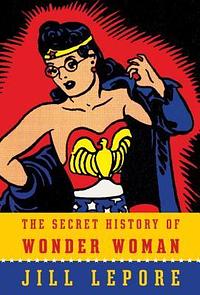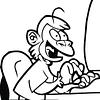Take a photo of a barcode or cover
Very informative biography of the author of Wonder Woman, and his secret family arrangements and ties that were hidden for decades. Interesting and written in short chapters, it's easy to pick up and put down. My only critique is that the interviews I heard with Leopore promoting the book essentially covered most of the really interesting information. Still, it's an interesting read, particularly to give more context for the suffragist and birth control movement.
This was an absolutely incredible telling of feminist history within the context of Wonder Woman's creation. This is perfect for comic book fans and feminists alike! The beginning part about the polygraph was a little dry tho. But I found how the women's movements influenced the iconic superhero throughout the ages to be completely fascinating. It was also great to see how Wonder Woman's influence and popularity compared to Batman and Superman within their separate histories. This was an excellent and compelling read well crafted with the inclusion of the relevant comic panels and pictures within the text.
However, I would've liked the footnotes to be on the same page that they reference rather than hidden in the back of the book. That'd be a super cool thing to do.
However, I would've liked the footnotes to be on the same page that they reference rather than hidden in the back of the book. That'd be a super cool thing to do.
If you're expecting a straightforward "this is how this character came to be"...you'll be disappointed, because it's much better than that.
Like Gerard Jones' MEN OF TOMORROW, Lepore's book takes a much deeper social/historical look at the context within which Wonder Woman sprang. Focusing on the early days of feminism in the 20th century, the book provides a very strong context which suggests that the character of Wonder Woman....might have been inevitable.
If you're an aficionado of comics history and/or early feminist thought, you might want to give this one a read.
Like Gerard Jones' MEN OF TOMORROW, Lepore's book takes a much deeper social/historical look at the context within which Wonder Woman sprang. Focusing on the early days of feminism in the 20th century, the book provides a very strong context which suggests that the character of Wonder Woman....might have been inevitable.
If you're an aficionado of comics history and/or early feminist thought, you might want to give this one a read.
Really fun cultural history of an iconic superhero. Touches on the history of feminism, women’s rights, birth control, psychology/scientific management, and much more. I wish I taught a history of comics class so I could use this book!
This is an enjoyable biography of [a:William Moulton Marston|89375|William Moulton Marston|https://s.gr-assets.com/assets/nophoto/user/u_50x66-632230dc9882b4352d753eedf9396530.png], the writer of Wonder Woman, and the women in his life who inspired him. [a:Jill Lepore|77397|Jill Lepore|https://d.gr-assets.com/authors/1341935958p2/77397.jpg] includes interesting feminist history - figures from the Suffragette movement and early fights, from attending or speaking at a university through what to do once you have that advanced degrees, and [a:Margaret Sanger|264856|Margaret Sanger|https://d.gr-assets.com/authors/1248363844p2/264856.jpg]'s fight for the right to birth control. These are all tied together through their influence on Marston's life - and one of his life-partners was Margaret Sanger's niece. The book also discusses the lifestyle of a polyamorous family in the 50s, and the strategies they used to avoid exposure. Interestingly, Marston's legal wife was the primary breadwinner as Marston stumbled through a variety of unsuccessful careers - all of the women in his life had careers and independent interests as well.
Overall, interesting book, I liked the information and the way it was tied together as well.
Overall, interesting book, I liked the information and the way it was tied together as well.
43. The Secret History of Wonder Woman (Audio) by Jill Lepore, read by the author
published: 2014
format: Overdrive audiobook, 9:05 (~250 pages)
acquired: Library
listened: Aug 17-24 & Oct 19-23
rating: 3½
Trying to review I’m tied-up between all the information that comes out of this book, the crazy interplay that kind of led to Wonder Woman, and Lepore’s flawed presentation.
The story of Wonder Woman involves lie detector tests, a complex and contradictory evolution of feminism, comic books, the birth control movement, polygamy, promotion and failure, WWII and, of course, fetish.
Wonder Woman is a wonderful World War II creation, and feminist hero created in window in time where the world was accepting and whose prime creator, Willam Marston, passed away, just before that window closed, when in the late 1940’s the revival of conservative American culture hammered in a major set-back to the feminist movement. His character, the Amazon Dianna Prince, became a secretary.
She is feminist as fetish, with everything that phrase implies. Lepore sums up the concept as “draw a woman who’s as powerful as Superman, as sexy as Miss Fury, as scantily clad as Sheena the jungle queen, and as patriotic as Captain America.” Gloria Steinem would rave about Marston’s Wonder Woman comics and the message they sent. She, Wonder Woman, was there to make a point that women were powerful, independent, and capable of everything we humans are capable of. She conquered her villains, regardless of the various ways she found herself tied-up or chained or otherwise challenged. Bondage is a theme...
She had a long road. Marston lived with his wife and another woman and fathered children with both. The other woman, Olive Bryne, was the niece of Margaret Sanger, the leader in birth control movement that was associated with suffragette movement, and is considered a founder of what became Planned Parenthood. Olive, who has a tough childhood, grew up in this environment and her bracelets became Wonder Woman’s. Marston was always a feminist, as was his legal wife, Elizabeth Holloway Marston. Wonder Women includes aspects of all three of these women and others Marston associated with, and in a big way she is a suffragette. I think it’s safe to say that Wonder Woman as she was and is could have come out of no other era.
I’m droning on, but there is a lot more to this story, including the sterile Comic Code and it’s legal origins in the battle between psychologists who saw comics as harmless and helpful to children, and those who saw them as racist, corrupting young women and driving men to homosexuality (Batman and Robin), among other things. (They were, of course, actually racist - even if the authors and illustrators likely didn't even think about that.)
Lepore should have written a fun fascinating book. She did all the research and interviews and has all the information laid out. But she somehow failed to find the right narrative drive. The book is a tough dull read that wanders around, only occasionally bringing the reader in. And the readers are very willing, we want in. It’s a great story.
Lepore reads the book on audio herself. I prefer books this way and appreciate that she did this. But potential listeners should note that she has a tough screechy voice with limited range. So, listening takes some tolerance.
Recommended to those who are patient with the imperfect presentation of great information.
published: 2014
format: Overdrive audiobook, 9:05 (~250 pages)
acquired: Library
listened: Aug 17-24 & Oct 19-23
rating: 3½
Trying to review I’m tied-up between all the information that comes out of this book, the crazy interplay that kind of led to Wonder Woman, and Lepore’s flawed presentation.
The story of Wonder Woman involves lie detector tests, a complex and contradictory evolution of feminism, comic books, the birth control movement, polygamy, promotion and failure, WWII and, of course, fetish.
Wonder Woman is a wonderful World War II creation, and feminist hero created in window in time where the world was accepting and whose prime creator, Willam Marston, passed away, just before that window closed, when in the late 1940’s the revival of conservative American culture hammered in a major set-back to the feminist movement. His character, the Amazon Dianna Prince, became a secretary.
She is feminist as fetish, with everything that phrase implies. Lepore sums up the concept as “draw a woman who’s as powerful as Superman, as sexy as Miss Fury, as scantily clad as Sheena the jungle queen, and as patriotic as Captain America.” Gloria Steinem would rave about Marston’s Wonder Woman comics and the message they sent. She, Wonder Woman, was there to make a point that women were powerful, independent, and capable of everything we humans are capable of. She conquered her villains, regardless of the various ways she found herself tied-up or chained or otherwise challenged. Bondage is a theme...
She had a long road. Marston lived with his wife and another woman and fathered children with both. The other woman, Olive Bryne, was the niece of Margaret Sanger, the leader in birth control movement that was associated with suffragette movement, and is considered a founder of what became Planned Parenthood. Olive, who has a tough childhood, grew up in this environment and her bracelets became Wonder Woman’s. Marston was always a feminist, as was his legal wife, Elizabeth Holloway Marston. Wonder Women includes aspects of all three of these women and others Marston associated with, and in a big way she is a suffragette. I think it’s safe to say that Wonder Woman as she was and is could have come out of no other era.
I’m droning on, but there is a lot more to this story, including the sterile Comic Code and it’s legal origins in the battle between psychologists who saw comics as harmless and helpful to children, and those who saw them as racist, corrupting young women and driving men to homosexuality (Batman and Robin), among other things. (They were, of course, actually racist - even if the authors and illustrators likely didn't even think about that.)
Lepore should have written a fun fascinating book. She did all the research and interviews and has all the information laid out. But she somehow failed to find the right narrative drive. The book is a tough dull read that wanders around, only occasionally bringing the reader in. And the readers are very willing, we want in. It’s a great story.
Lepore reads the book on audio herself. I prefer books this way and appreciate that she did this. But potential listeners should note that she has a tough screechy voice with limited range. So, listening takes some tolerance.
Recommended to those who are patient with the imperfect presentation of great information.
3.5 -An interesting read with unique perspectives about influential people in history. Of course I long knew and admired Margaret Sanger, but I just had no idea the depth of her impact. Nor was I aware of the numerous less famous people mentioned or the lie detector connection. Please note as others have that this is much more a historical anthology about the long, still unfinished road to women's rights than about comic book history. Very informative and worthwhile.
informative
slow-paced
It's important to understand just what this book is. It is not, despite its title, a comprehensive history of the character Wonder Woman, like [b:Superman: The High-Flying History of the Man of Steel|13144498|Superman The High-Flying History of the Man of Steel|Larry Tye|https://d.gr-assets.com/books/1333565288s/13144498.jpg|18321877]. Instead it's the story of the life and times of Wonder Woman creator William Moulton Marston and his unconventional (and somewhat confusing, since people tend to have the same names) extended family. Also, it's a pretty detailed chronicle of the feminist movement, starting with the earliest days of suffrage, going up through Margaret Sanger and the founding of Planned Parenthood.
That's all fine and good, but it does mean that the actual creation of Wonder Woman doesn't get discussed until the last third of the book. And its hyper focus on Marston's family means the post-Marston story of Wonder Woman is relegated to the last two chapters. This includes her many attempts at television are only barely discussed, and those days in the comics where she had no powers are only mentioned in passing. And if you were hoping to see a discussion of any recent creators' work (like Gail Simone?) you would be disappointed. There's no room for that here.
I do think there's probably a good book to be written that fully chronicles the character's legacy. But until then, this one will stand as a decent, if flawed, substitute.
That's all fine and good, but it does mean that the actual creation of Wonder Woman doesn't get discussed until the last third of the book. And its hyper focus on Marston's family means the post-Marston story of Wonder Woman is relegated to the last two chapters. This includes her many attempts at television are only barely discussed, and those days in the comics where she had no powers are only mentioned in passing. And if you were hoping to see a discussion of any recent creators' work (like Gail Simone?) you would be disappointed. There's no room for that here.
I do think there's probably a good book to be written that fully chronicles the character's legacy. But until then, this one will stand as a decent, if flawed, substitute.





